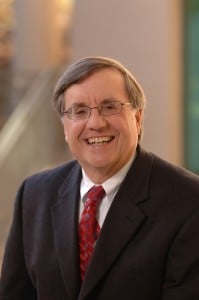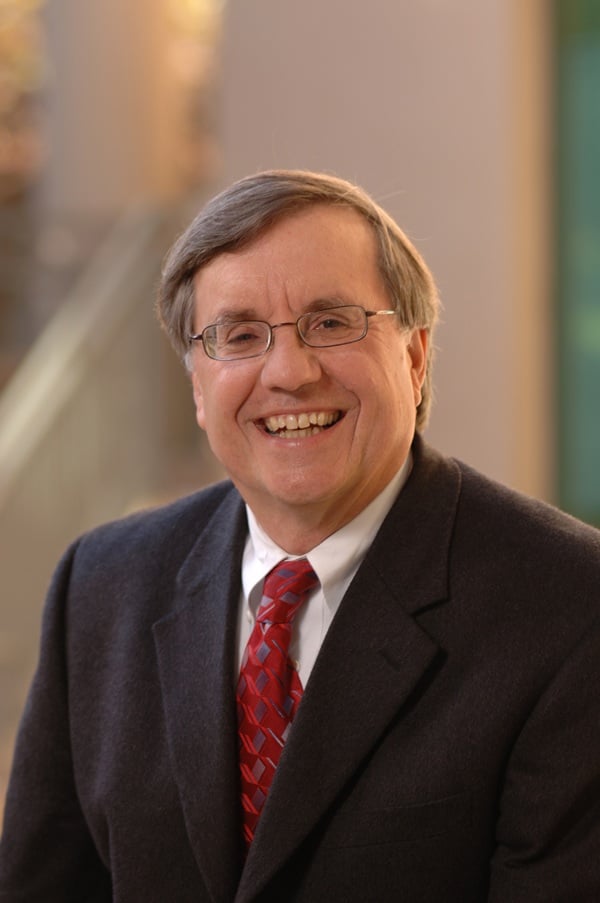
John Shoven strives to contribute to global solutions through economics
The word “economics” can bring to mind different images. Wall Street. Men and women in grey suits. Views of towering skyscrapers, stock prices and fluctuating lines of the Dow and NASDAQ coasting up and down large monitors.
But those images — intense and colorless on their own — fail to fully paint economics or, for that matter, John Shoven: a man whose passion for economics has stretched across an illustrious 39-year career at Stanford University.
The Charles R. Schwab Professor of Economics and Wallace R. Hawley Director of the Stanford Institute for Economic Policy Research (SIEPR), Shoven has dedicated much of his life to economics. Even much of his office space is dedicated to pictures of and gifts from previous classes and advisers.
“Economics is about efficiently using the resources that you have,” Shoven said, “as a country or, for that matter, as a globe.”
According to Shoven, economics can help solve many of the problems facing the next generation. For instance, Shoven is currently working on a research project that provides a model by which individuals can maximize both their private savings and Social Security after retirement.
According to Shoven, most people immediately apply for Social Security when they’re eligible, which he calls “leaving money on the table.” Instead, Shoven suggests that people use private savings to put off, rather than supplement, their Social Security.
“Say they retire at 62,” he said. “Maybe they should start their Social Security at 68 and use those first six years and live off their pension, savings and assets. And the reason they should defer Social Security — and some people should defer it to 70 — is that the government gives you larger monthly benefits if you start later than if you start early, and the difference between starting late and starting early is actually quite significant.”
Another problem Shoven believes can be solved through economics is deciding when to retire given the increasing life expectancy in America. In his opinion, people will soon have to work until at least age 70 in order to be able to support themselves after their retirement. He highlights this as a factor that contributes to the poor U.S. economy, since the government can’t afford to support the mass of retiring baby boomers living well into old age.
“What is at the heart of it, or at least a big part of it, is the retirement benefits that [the government] just can’t afford,” Shoven said. “The good news is we’re living a lot longer. The bad news is we have not adjusted our finances and our retirement [policies] for that fact.”
In addition to Social Security and retirement, issues such as global warming and health care costs are also what Shoven calls “economic problems,” and he argues they can be solved using economic incentives.
Along with his research, Shoven has held many administrative roles, such as chairman of the Department of Economics from 1986 to 1989, dean of the School of Humanities and Sciences and director of SIEPR, a position he currently holds.
Yet despite his dedication to economics, Shoven majored in physics with a minor in economics at UC-San Diego. He attributes his decision to major in physics to Sputnik, a satellite launched in 1957 by the Soviet Union.
At that time “there was this tremendous emphasis on science and engineering, and I thought, ‘Well, science is cool so I’ll do science,’” he said.
At UCSD, Shoven worked in a lab that focused on satellite-based experiments for almost three years. However, weighty, long science projects and a desire to help the faltering ’70s economy pushed Shoven toward economics and consequently toward a graduate degree in economics before accepting a job at Stanford.
His involvement in economics, however, extends beyond Stanford to include work with companies in the Silicon Valley and the National Bureau of Economic Research (NBER). NBER, a non-profit research group, allows Shoven to interact with other economists who study similar topics.
“It’s just a way for me to connect with a large group of scholars that are doing similar work, and I find it very valuable,” Shoven said of NBER.
Shoven also organizes and lectures at a workshop for high school economics teachers every summer in the Bay Area.
Despite having many responsibilities, Shoven never regrets accepting them. He voluntarily chooses his workload, even teaching more classes than necessary.
And it is with his teaching that he has impacted his students.
Former student Susan Meaney ’82 remembers Shoven as a mentor who really strove to share his passion for economics with his students.
“He had a way of making you understand how [economics] was important and how it applied to your life,” Meaney said.
John Pencavel, an economics professor and a colleague of Shoven’s for 39 years, also gave high praise for Shoven’s teaching and research.
“He is distinctive in that almost anything he does, he does very well,” Pencavel said.
Despite his lifelong passion for economics, Shoven participates in a multitude of other activities. For one, he is an avid Stanford sports fan and wears a step counter that regularly flashes “Beat Cal.”
“I think Stanford is really unique in combining top athletics and top academics,” Shoven said. “There’s nowhere else that does it as well as we do it.”
Shoven also loves traveling, which he considers lucky since his job requires traveling to conferences from New York to Iceland.
And he doesn’t plan on retiring anytime soon. Shoven jokes that he will “lead by example” those he believes will have to work longer to sustain themselves after retirement.
After all, Shoven says there is still much to do.
“We should be humble as economists,” Shoven said. “We’ve got millions of people who want jobs in the United States who can’t get jobs. There is a lot of important work to be done so that we can manage this economy better.”
